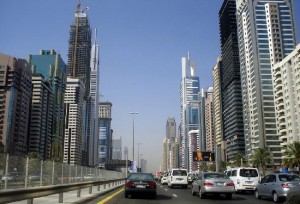
Arab Investment Forum (AIF 2009) 2009 was launched today (March 24) by His Highness Sheikh Nahayan bin Mubarak Al Nahyan, UAE Minister of Higher Education and Scientific Research, in the presence of H.E. Adnan Kassar, President of the General Union of the Chambers of Commerce, Industry and Agriculture for Arab Countries and H.E. Salah Al Shamsi, President of the UAE Federation of Chambers of Commerce and Industry. AIF 2009, which lasts for two days and concludes its sessions on Wednesday, March 25, under the banner “Wealth Management in the Era of Crisis,” was organized by Etisal Event Management.
Dr. Salim Al Hoss, former Lebanese Prime Minister and former economics professor at The American University in Beirut in his speech at the opening session said: “It seems that Lebanon is taking some advantage of the global crisis, because of influx of Arab funds which lost deployment opportunities elsewhere in the global markets due to the crisis and were consequently transferred to Lebanon. This is because the Lebanese economic image seemed brighter. But we cannot however contiinue betting on the continuation of this privileged status for Lebanon in the medium or long terms, for many reasons.
“Firstly, it is because the Lebanese economy, in the end, is closely linked to the general Arab economy, particularly the Gulf markets. There are thousands of Lebanese working in different Arab countries, especially the Gulf countries, and if the Gulf is affected by implications of the global crises, it will lead to a shrinking demand for Lebanese labor and to the firing of large numbers of workers. “Secondly, Lebanon attracts a large volume of Arab funds as deposits in Lebanese banks, real estate investments or contributions to trading, industrial and tourism firms. The disadvantages of the global crisis on the Gulf economy can have a negative impact on the flow of these funds.
“Thirdly, Lebanon exports agricultural and industrial products to the Arab world and provides many services for people in the Gulf like tourism, brokerage and representation in the trade and financial fields as well as expertise, consultancy and studies in various other fields, educational and medical services, and so on. These different services can be negatively affected by the impact of the global crisis on the Gulf economies”.
He said that the length of the paved road network in Dubai has increased from 1,860 km in 2003 to nearly 2,657 km in 2008. He pointed out that the volume of expenditure on the road network increased from nine billion dirhams in 2003 to more than 19 billion dirhams last year. All the projects were carried out by private sector companies.
Turning to the Dubai Metro project, he said that it had a completion percentage in the Red Line of more than 80 per cent. The completion of the implementation of all overhead bridges and the completion of construction works in the tunnels of the Green Line, will now start. Al Tayer added: “The authority has signed an advertisement contract for the Dubai Metro project with an alliance composed of three companies, which design, work for ad space, advertising and marketing services in the Dubai Metro stations and on subway cars. The outlay of this project is estimated at three billion dirhams.”
Al Tayer also spoke about the investment opportunities in public transportation projects by pointing out that the number of buses increased from 580 buses in 2007 to 857 last year and the number will rise to 1,833 buses in the current year, with the number of users increasing from 100 million bus passengers in 2007 to 120 million last year.
Arab Investment Forum 2009 continues today, through an opening session entitled Crisis Management and Current Requirements, which will be led by Mirza Al-Sayegh, Director of the Office of His Highness Sheikh Hamdan bin Rashid Al Maktoum, Dr. Adel Fahmi Badr, Economic Advisor to the Emirates and Saudia Management and Economic Consultancy, Dr. Nagwa Diab, Executive Director of the National Academy for Research and Development (NARD) and Aisha Sultan, journalist and Director of political programs on Dubai TV. AIF’s second day will included a workshop titled “Women and the Global Financial Crisis” hosted by Mrs. Khawla Lootah, Board Member of the Dubai Business Women Council and Dr. Fatima Saeed Al Shamsi, Secretary- General of the UAE University.
The second day will conclude with a special work session titled “Agricultural Economics and Animal Production” which will be presented by Dr. Abdul-Tawab Al Yamany, Dr. Assem Shaltout, Dr. Mohammed Alnahrawi, Dr. Emam Mohammed Rajab and Dr. Adel Abul Naja, Advisor to the Emirates and Saudia Management and Economic Consultancy. In the concluding ceremonies, Etisal Event Management will honor the UAE Media and the participants covering the event along with a group of distinguished media professionals and media personnel working in different sectors of the Media.
Tuesday, March 24, 2009, www.aim168realestate.com
















